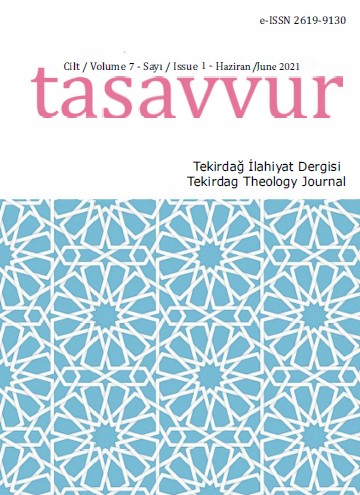Çağdaş Hadis Şerh Çalışmalarının Bir Örneği Olarak İtyûbî’nin Sahîh-i Müslim ve Mukaddimesi Şerhleri
Commentary on Sahîh-i Muslim and Her Muqaddimah of İtyubî as an Example of Contemporary Hadith Commentary Studies
Author(s): Cemil Cahit MOLLAİBRAHİMOĞLUSubject(s): Islam studies, Hermeneutics
Published by: Tekirdağ Namık Kemal Üniversitesi İlahiyat Fakültesi
Keywords: Hadith; Ṣaḥîḥ Muslim’s Commentary; Muhammad b. Ali al- Ityubi; Kurratü ayni’l-muhtâc; al-Bahru’l-muhît;
Summary/Abstract: Along with Sahîh-i Bukhari, many commentaries and memoirs have been made on Sahîh-i Muslim, which is accepted as the most reliable source of hadith and consists of sound narrations. Among the commentaries written today, the comprehensive commentary, which is a product of labor that cannot be ignored and stands out whit some features, is Ethiopian scholar Mohammed b. The commentary of Ali al-İtyubî’s (1947-2020) Sahîh-i Muslim commentary on al-Bahru’l-muhît and his holy book is Kurratü ayni’l-muhtâc. This article aims to briefly introduce İtyûbî with his educational life and Works, the method he followed in his annotations, the sources he used, his reports that do not require many works, his criticisms and evaluations, his perspective, his world of thought, and to reveal and evaluate his different approaches and ideas on certain subjects. Reaching 47 volumes together with the Commentary on the Muqaddima, the work has the feature of being the widest commentary of Sahîh-I Muslim. By transmitting the information in the previous works in a compact and collective manner, he did not leave the need to apply to them, and he made the hadiths easier to understand whit the memzuc method that explains word by word. The extensive interpretation of hadiths, the mention of different narrations, and the fact that the judgments derived from hadiths are regarded as material are some of the issues that make commentary important. This article aims to briefly introduce İtyûbî with his educational life and works, the method he followed in his commentaries, the resources he used, his transmissions that do not reguire many works, his criticisms and evaluations, his perspective, his world of thought, and to reveal and evaluate his different approaches and ideas on certain subjects.
Journal: Tasavvur Tekirdağ İlahiyat Dergisi
- Issue Year: 7/2021
- Issue No: 1
- Page Range: 1-38
- Page Count: 38
- Language: Turkish

